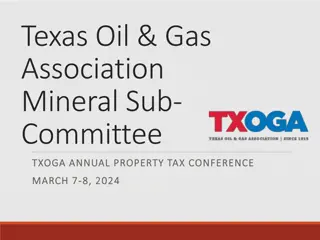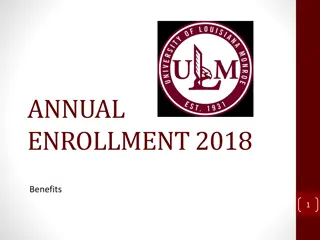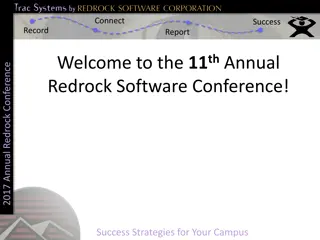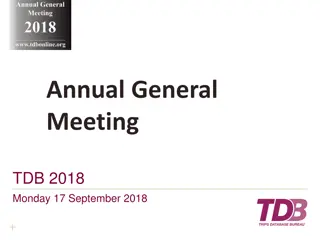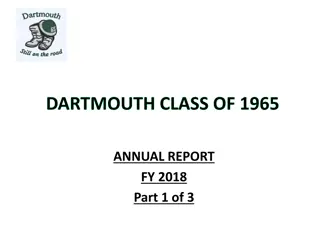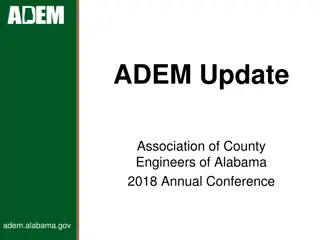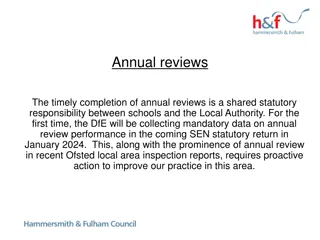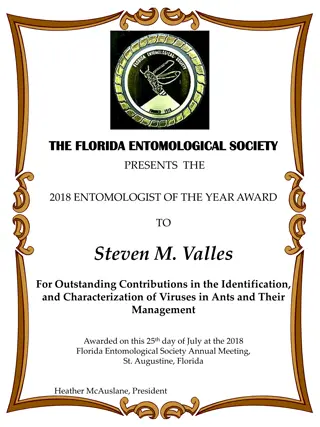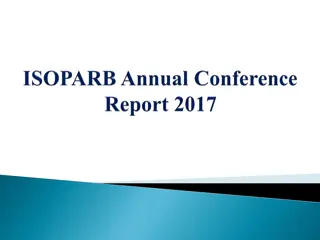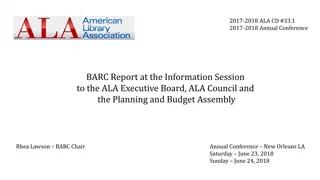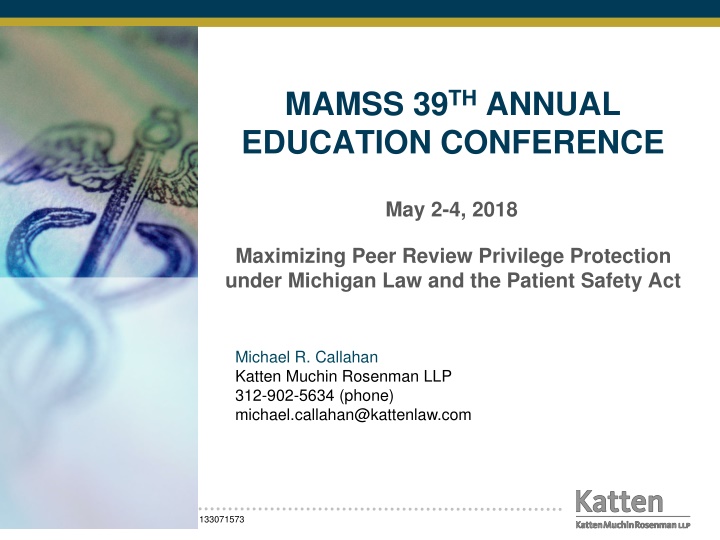
Maximizing Peer Review Privilege Protection under Michigan Law and the Patient Safety Act
Explore the case of Ms. Hada Bad-Outcome and learn about the legal implications for healthcare providers in a medical malpractice lawsuit. Understand the importance of peer review privilege protection and regulatory compliance under Michigan Law and the Patient Safety Act. Gain insights from Michael R. Callahan, a senior partner at Katten Muchin Rosenman LLP, who specializes in healthcare legal issues.
Download Presentation

Please find below an Image/Link to download the presentation.
The content on the website is provided AS IS for your information and personal use only. It may not be sold, licensed, or shared on other websites without obtaining consent from the author. If you encounter any issues during the download, it is possible that the publisher has removed the file from their server.
You are allowed to download the files provided on this website for personal or commercial use, subject to the condition that they are used lawfully. All files are the property of their respective owners.
The content on the website is provided AS IS for your information and personal use only. It may not be sold, licensed, or shared on other websites without obtaining consent from the author.
E N D
Presentation Transcript
MAMSS 39THANNUAL EDUCATION CONFERENCE May 2-4, 2018 Maximizing Peer Review Privilege Protection under Michigan Law and the Patient Safety Act Michael R. Callahan Katten Muchin Rosenman LLP 312-902-5634 (phone) michael.callahan@kattenlaw.com 133071573
Speaker Bio Michael R. Callahan, Senior Partner - michael.callahan@kattenlaw.com Michael R. Callahan, JD, is a senior partner in the Health Care Practice Group at Katten Muchin Rosenman LLP in Chicago. Callahan assists hospital, health system, and medical staff clients on a variety of healthcare legal issues related to Accountable Care Organizations (ACO), Patient Safety Organizations (PSO), healthcare antitrust issues, Health Insurance Portability and Accountability Act (HIPAA) and regulatory compliance, accreditation matters, general corporate transactions, medical staff credentialing, and hospital/medical staff relations. He is a frequent speaker on topics including ACOs, healthcare reform, PSOs, healthcare liability and peer review maters, and serves as an advisory board member for HCPro s Credentialing Resource Center. He also was appointed as the public member representative on he NAMSS board of directors. Callahan was a professor in DePaul University s Master of Laws in Health Law Program, where he taught a course on managed care. After law school, he served as law clerk to Justice Daniel P. Ward of the Illinois Supreme Court. Callahan also was the Chair of the Credentialing and Peer Review Practice Group for the American Health Lawyers Association. 1 1
Hypothetical You get a call from the Health System CMO, Dr. Susan Carealot, who also Chairs the Health System's Quality and Credentials Committee. She informs the RM and GC, that the Health System's administrative offices have received a subpoena from a medical malpractice attorney for all and Health System records and documents pertaining to the review of care provided to a Ms. Hada Bad-Outcome. Ms. Hada Bad-Outcome's family is suing the providers involved in her care for malpractice and negligent credentialing. All of her providers are Health System participants, including a PCP employed by Health System Physician Group, a cardiac surgeon who is a member of the hospital's medical staff and of a participating independent physician group of six (6) surgeons, a Health System hospital, and an affiliated skilled nursing facility. 2 2
Hypothetical (cont'd) Dr. Carealot tells you that Ms. Hada Bad-Outcome is a 65 year old CEO of a large, closely-held family company, who has 4 minor children and a stay-at- home husband, who experienced severe complications after her hypertension went undiagnosed by a Health System PCP. Ms. Bad-Outcome had seen the PCP because she was experiencing severe headaches, anxiety and nosebleeds. He believed she was stressed and dehydrated from travel, and prescribed zoloft and regular exercise. Two weeks later she experienced a heart attack, and after a CABG procedure performed by the independent surgeon, developed post-surgical complications, and had a stroke. During her subsequent rehabilitation at a SNF, a medication error caused her to have another stroke, and she is now in a permanent vegetative state. 3 3
Hypothetical (cont'd) Dr. Carealot provides you copies of the applicable peer review policies of the Health System, and the credentialing and quality review procedures of the Hospital, physician group, and the SNF, and asks you to analyze whether the medical records and peer review materials reviewed and produced the Health System facilities are privileged from discovery under Michigan state law and/or the Patient Safety Act. She does not want to release the records because after reviewing the case, the Health System's Quality and Credentials Committee determined that the PCP, who had a history of noncompliance with care protocols and poor quality scores, had not followed standard procedures for assessing the patient for hypertension. 4 4
Hypothetical (cont'd) She also tells you that the cardiac surgeon had a history of similar post- surgical complications, and that based on this data, they decided he should be terminated from participation in the System's ACO and managed care programs. Finally the SNF is under an accreditation watch status with The Joint Commission due to several patient complaints of substandard care. 5 5
Factors/Questions to be Assessed Are you seeking state and/or federal privilege protections? What is the scope of protected activities? peer review, quality improvement, RCAs, adverse events. What corporate entities, licensed facilities, licensed health care practitioners or others are protected under state/federal laws? What committees or organizational construct is required in order to assert the protections? Are your existing bylaws, rules, regs and policies properly structured to maximize available privilege protections? Can privileged information be shared across the Health System without waiving the privilege? 6 6
Factors/Questions to be Assessed (cont'd) How does applicable case law affect statutory interpretation? What impact, if any, of mandated adverse event reporting obligations? Never events, hospital acquired infection Do state privilege protections apply to federal claims filed in federal court, i.e., antitrust, discrimination? 7 7
Complete view of an operational CIN CIN COO CFO CMO CNO COO Health Home People Payer Partners 8 8
Summary of Michigan Peer Review Statute Michigan Peer Review Statute Mich. Comp. Laws Ann 331.531 A person, organization, or entity may provide to a review entity information or data relating to the physical or psychological condition of a person, the necessity, appropriateness, or quality of a health care rendered to a person, or the qualifications, competence, or performance of a health care provider. A "review entity" means as duly appointed peer review committee of: A health care facility A health care association A health care network, a health care organization, or a health care delivery system composed of licensed health professionals 9 9
Summary of Michigan Peer Review Statute (cont'd) A professional standards review organization qualified under federal or state law An organization established by a state association of hospitals or physicians, or both, that collects and verifies the authenticity of documents and other data concerning the qualifications competence, or performance of licensed health professionals and that acts as a health facility's agent under HCQIA A professional corporation, limited liability partnership, or partnership consulting of 10 or more allopathic physicians, osteopathic physicians, or licensed podiatric physicians and surgeons A qualified hospital patient safety organization (PSO) that collects data on serious adverse events 10 10
Michigan Peer Review Statute Ruling Key Court Rulings Committees and individuals which are not a "duly appointed" peer review committee performing the functions under the peer review statute are not covered State review statutes cannot pre-empt or apply in federal claims such as antitrust or discrimination law suits While the courts do not generally interfere with or substitute their judgment for that of the hospital and medical staff in peer review and related matters, the courts will determine whether the bylaws, fair hearing and related policies were followed and if the process and proceedings were fair 11 11
Complete view of an operational CIN CIN COO CFO CMO CNO COO Health Home People Payer Partners 12 12
Analysis of Michigan Peer Review Statutes Analysis Does statute arguably protect requested records? Medical records No Bylaws, policies and procedures No Peer review records and entities Does Health System Quality and Credentials Committee qualify as a peer review committee? Probably because a health care network or delivery system qualifies but the question is whether the Committee was "duly appointed" to perform review functions of a "review entity Is the Hospital and SNF covered? Yes but same questions as for the Health System. 13 13
Analysis of Michigan Peer Review Statutes (cont'd) Is the Hospital's employed physician group covered Yes but same question Is the independent surgical group covered? No because it has less than 10 physicians Can privileged information be shared across the Health System? Under the hypothetical, only peer review/quality information generated by review entities and their duly appointed committees will be privileged. Under Michigan law the privilege cannot be waived but information must be used for the purpose of improving patient care and/or reducing morbidity or mortality. 14 14
Analysis of Michigan Peer Review Statutes (cont'd) Privileged information arguably could be shared across the Health System. Does privilege apply in federal proceedings? No But what if the reviews are not conducted by a duly appointed committee? Probably not privileged 15 15
Complete view of an operational CIN CIN COO CFO CMO CNO COO Health Home People Payer Partners 16 16
Patient Safety and Quality Improvement Act of 2005 Privileged Patient Safety Work Product Any data, reports, records, memoranda, analyses (such as Root Cause Analyses (RCA)), or written or oral statements (or copies of any of this material) which could improve patient safety, health care quality, or health care outcomes; And that: Are assembled or developed by a provider for reporting to a PSO and are reported to a Patient Safety Organization (PSO), which includes information that is documented as within a patient safety evaluation system (PSES) for reporting to a PSO, and such documentation includes the date the information entered the PSES; or Are developed by a PSO for the conduct of patient safety activities; or Which identify or constitute the deliberations or analysis of, or identify the fact of reporting pursuant to, a PSES. 17 17
Patient Safety Act (cont'd) What types of information can be considered for inclusion in the PSES for collection and reporting to the PSO if used to promote patient safety and quality? Medical error or proactive risk assessments, root cause analysis Risk Management Not all activities will qualify such as claims management, but incident reports, investigation notes, interview notes, RCA notes, etc., tied to activities within the PSES can be protected Outcome/Quality may be practitioner specific Peer review Relevant portions of Committee minutes for activities included in the PSES relating to improving patient quality and reducing risks Deliberations or analysis 18 18
Patient Safety Act (cont'd) What is not PSWP? Patient's medical record, billing and discharge information, or any other original patient or provider information Information that is collected, maintained, or developed separately, or exists separately, from a PSES. Such separate information or a copy thereof reported to a PSO shall not by reason of its reporting be considered PSWP PSWP assembled or developed by a provider for reporting to a PSO but removed from a PSES is no longer considered PSWP if: Information has not yet been reported to a PSO; and Provider documents the act and date of removal of such information from the PSES 19 19
Patient Safety Act (cont'd) Reports that are the subject of mandatory state or federal reporting or which may be collected and maintained pursuant to state or federal laws be treated as PSWP Michigan does not have mandated adverse event reporting requirements but federal requirements apply What entities are covered under the Act? All entities or individuals licensed under state law to provide health care services or which the state otherwise permits to provide such services, i.e., hospitals, SNFs, physicians, physician groups, labs, pharmacies, home health agencies, etc. A non-licensed corporate entity that owns, controls, manages or has veto authority over a licensed provider is considered a provider. 20 20
Complete view of an operational CIN CIN COO CFO CMO CNO COO Health Home People Payer Partners 21 21
Patient Safety Act Analysis Analysis Do the privilege protections apply to the requested documents? Medical records No PSES policies and procedures No Records that must be reported to a state or federal governmental entity? No Committee reports, analysis, etc. Yes, if collected and identified in a system-wide PSES or in the PSES of a provider which has collected the PSWP for reporting to a PSO and is reported or if it constitutes deliberation or analysis 22 22
Patient Safety Act Analysis (cont'd) Are all Health System entities covered? Yes All licensed providers facilities including the Hospital, employed physician group and the SNF and the physicians are covered if participating in a PSO with appropriate system-wide or individual PSES policies Health System parent corporation is not covered unless it is a licensed provider and/or it owns, controls or manages licensed providers or has veto authority over decision making If not, patient safety and peer review activities must be conducted in a licensed facility. Are peer review activities outside of or separate from a duly appointed committee covered? Yes if described and included in their PSES policy 23 23
Patient Safety Act Analysis (cont'd) What about the independent physician group Yes but must have an agreement with a PSO and have a PSES policy and otherwise comply with the Patient Safety Act Can PSWP be shared? Identifiable PSWP can be shared by and between all affiliated providers but not the independent physician group Physicians and other licensed professionals need to authorize, in writing, the sharing of identifiable PSWP Can protections be waived? There are disclosure exceptions but privilege protections are never waivable Do protections apply in all state and federal proceedings? Yes 24 24
Comparison of Michigan Peer Review Statute to the Patient Safety Act Patient Safety Act The confidentiality and privilege protections afforded under the PSA generally apply to reports, minutes, analyses, data, discussions, recommendations, etc., that relate to patient safety and quality if generated or managed, or analyzed within the PSES and collected for reporting to a PSO protections are not limited to duty appointed committees of qualifying review entities. The scope of what patient safety activities can be protected, generally speaking, is broader than the activities and documents privileged under the Michigan statute. The scope of what entities can seek protection are very similar. The protections under the PSA apply in both state and, for the first time, federal proceedings. The Michigan statute only applies in state proceedings and state claims in federal courts. 25 25
Comparison of Michigan Peer Review Statute to the Patient Safety Act (cont'd) The protections can never be waived under both laws. PSA pre-empts less protective state law. Non-provider corporate parent organization can generate privileged under both Michigan statute and PSA if structured correctly. PSWP can be shared among affiliated providers but whether information can be shared under Michigan law is not quite as clear. Key to these protections under both laws is the design of the provider s bylaws and policies and its patient safety evaluation system ( PSES ). 26 26
Katten Muchin Rosenman LLP Locations AUSTIN 111 Congress Avenue Suite 1000 Austin, TX 78701-4073 +1.512.691.4000 tel +1.512.691.4001 fax DALLAS Comerica Bank Tower 1717 Main Street Suite 3700 Dallas, TX 75201-7301 +1. 214.765.3600 tel +1. 214.765.3602 fax LONDON Paternoster House 65 St Paul s Churchyard London EC4M 8AB United Kingdom +44.0.20.7776.7620 tel +44.0.20.7776.7621 fax NEW YORK 575 Madison Avenue New York, NY 10022-2585 +1.212.940.8800 tel +1.212.940.8776 fax SHANGHAI Suite 4906 Wheelock Square 1717 Nanjing Road West Shanghai 200040 P.R. China +86.21.6039.3222 tel +86.21.6039.3223 fax CHARLOTTE 550 South Tryon Street Suite 2900 Charlotte, NC 28202-4213 +1.704.444.2000 tel +1.704.444.2050 fax HOUSTON 1301 McKinney Street Suite 3000 Houston, TX 77010-3033 +1.713.270.3400 tel +1.713.270.3401 fax LOS ANGELES CENTURY CITY 2029 Century Park East Suite 2600 Los Angeles, CA 90067-3012 +1.310.788.4400 tel +1.310.788.4471 fax ORANGE COUNTY 100 Spectrum Center Drive Suite 1050 Irvine, CA 92618-4960 +1.714.966.6819 tel +1.714.966.6821 fax WASHINGTON, DC 2900 K Street NW North Tower - Suite 200 Washington, DC 20007-5118 +1.202.625.3500 tel +1.202.298.7570 fax CHICAGO 525 West Monroe Street Chicago, IL 60661-3693 +1.312.902.5200 tel +1.312.902.1061 fax IRVING 545 East John Carpenter Freeway Suite 300 Irving, TX 75062-3964 +1.972.587.4100 tel +1.972.587.4109 fax LOS ANGELES DOWNTOWN 515 South Flower Street Suite 1000 Los Angeles, CA 90071-2212 +1.213.443.9000 tel +1.213.443.9001 fax SAN FRANCISCO BAY AREA 1999 Harrison Street Suite 700 Oakland, CA 94612-4704 +1.415.293.5800 tel +1.415.293.5801 fax Katten refers to Katten Muchin Rosenman LLP and the affiliated partnership as explained at kattenlaw.com/disclaimer. www.kattenlaw.com Attorney advertising. Published as a source of information only. The material contained herein is not to be construed as legal advice or opinion.




